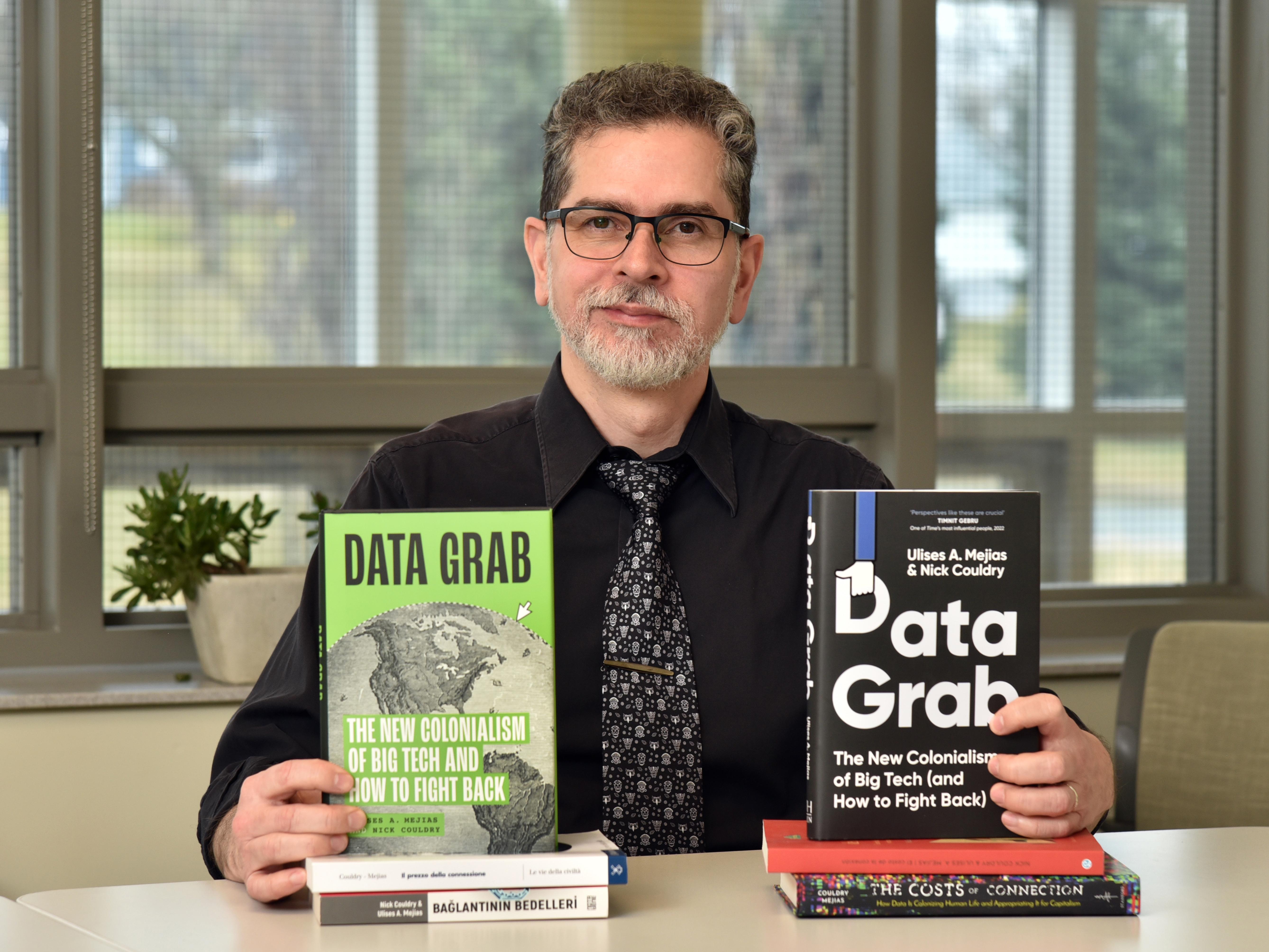SUNY Oswego communication studies professor Ulises Mejias and co-author Nick Couldry of the London School of Economics and Political Science have a new book out on an ever-timely topic, “Data Grab: The New Colonialism of Big Data and How to Fight Back.”
The book is a mass-market adaptation of their book “The Costs of Connection: How Data is Colonizing Human Life and Appropriating It for Capitalism.” That 2019 publication, geared mainly toward academic audiences, became very influential in educational circles and led to invitations for the authors to present and publish all over the globe.
“We were approached by Penguin, the largest general audience publisher in the world,” Mejias said. “They wanted to do a version of the previous book for a general audience. They thought it was an important topic that they wanted to make more widely available.”
Headlines about artificial intelligence, data breaches, invasive social platforms, online surveillance and more show that the topic is part of most people’s daily lives, whether they know it or not.
While connecting with others is a positive desire, society has reached the point where the promotion of connecting people, science, medicine and other fields is seen as the only path to progress, the authors noted. However, the resulting massive data collection and related surveillance means that lives are transformed into commodities, they added, which suggests weighing the costs of all these connections.
Mejias realizes that “colonialism” is a heavy word, given some of the actions connected to the traditional definition, but also notes that he finds it the most appropriate analogy to how companies can cavalierly use personal information for profit.
Rewriting and augmenting
Mejias and Couldry took about a year to rewrite the book, as well as updating or augmenting some segments.
“By then we had the benefit of presenting our argument all over the world and had a lot of feedback we could incorporate into this new book,” Mejias said.
The new release includes separate editions in the U.S. (under the University of Chicago Press imprint) and in the U.K. Penguin is working on additional versions for the German and South Korean markets, perhaps with more to follow.
The global popularity of their research on the topic was also reflected in “The Costs of Connection” having been translated into Spanish, Turkish and Italian.
For the new book, the authors decided to restructure the arrangement and content, going with different examples and chapter structures.
“We also added a chapter at the end for what people can do to contest the power the big technology companies are acquiring,” Mejias said. “The chapter is about resisting what is happening with our data.”
Rapid changes in technology, particularly the emergence of digital intelligence and artificial intelligence (AI) was another point of emphasis in the new book. AI raises so many challenges, Mejias noted: It can take jobs, steal others’ work without compensation or even credit, discriminate against people in a myriad of ways and incorporate misinformation into search results.
AI needs training data, which appropriates information from content creators. This training data comes from the public but those creators do not get a say in how it is used nor any credit, Mejias noted.
“Data Grab” ultimately looks to inform readers as well as prepare them for how to navigate a world where information they think might be private is collected and commodified.
“The first thing I would hope is that readers would understand what is happening today with data in a historical context,” Mejias said. “The technology is new but it’s part of a larger process of colonialism. That longer historical lens is helpful.”
He also hopes the book will inspire readers to know they can make a positive difference.
“We also want people to know that they are not powerless in this process,” Mejias said. “There are ways we can resist this new order. We can learn from the past and from the people who have resisted before.”
Praise from other researchers, academics and professionals on the book’s University of Chicago web page mirrors the positive feedback they have received and provides ongoing encouragement for the authors’ important work.
“We are very encouraged by some of the advance praise we have already received,” Mejias said. “We hope the book will have an impact and be read by a lot of people.”




